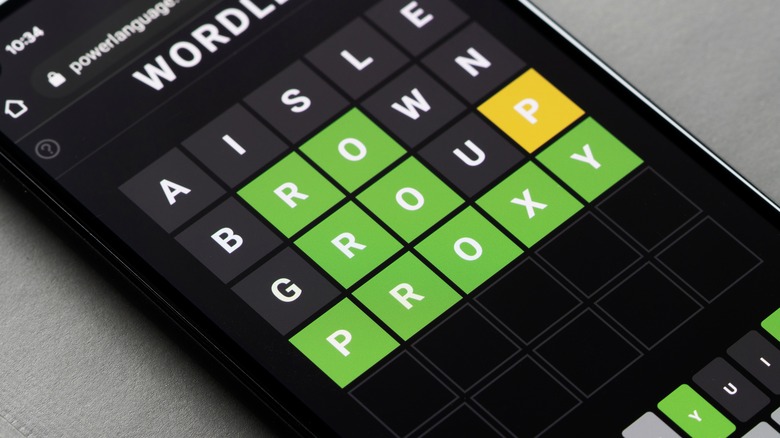Wordle Removed A Word As An Answer. Here's Why
During the pandemic, a surprising little word game began taking over the internet. Gamers and non-gamers alike fell in love with "Wordle" for its inventive yet simple premise. Then, as with many independent games, a major corporation bought up the IP. When The New York Times acquired "Wordle" shortly after it began going viral online, fans were worried. Many suspected that the major news outlet would change what made the word puzzle game so fun. However, many things have stayed the same in the aftermath of the acquisition, and players continue to enjoy their daily short puzzle, sharing results on social media and speculating about strategies for the best starting word. Now, The New York Times is making headlines for removing a specific word from "Wordle," surprising fans and starting an important conversation in the process.
This isn't the first time The New York Times has removed words from "Wordle." Shortly after acquiring the word puzzle game, one Redditor investigated the site's code to find that the new owners removed several words from the game's potential answers. While most of those words were slurs or other offensive terms, the change showed that the new owners of "Wordle" weren't afraid to make changes if needed. While the latest removed word isn't offensive in and of itself, its removal is related to a timely political issue.
The New York Times wants to avoid politics in games
A lengthy announcement from The New York Times explained that May 9th's "Wordle" puzzle might look different for some players. "Some users may see an outdated answer that seems closely connected to a major recent news event," the statement read. "This is entirely unintentional and a coincidence — today's original answer was loaded into Wordle last year." The word in question? "Fetus." The word was set to be a puzzle answer shortly after the release of a leaked Supreme Court draft opinion that suggested Roe v. Wade be overturned.
The New York Times maintained that "Wordle," and all Times games, are meant to be a release from the societal pressures of daily life, and that the offending answer was selected randomly and programmed over a year ago. The Times continued to explain that refreshing your browser should fix the problem and deliver the new puzzle to players, but the publication acknowledged that all players might not take that step.
While The New York Times wants to keep its games out of politics, some game developers chose to step up and advocate for employees affected by potentially changing reproductive rights laws. Bungie broke its silence on the leaked draft by issuing a statement supporting its employees and vowing to protect them.


